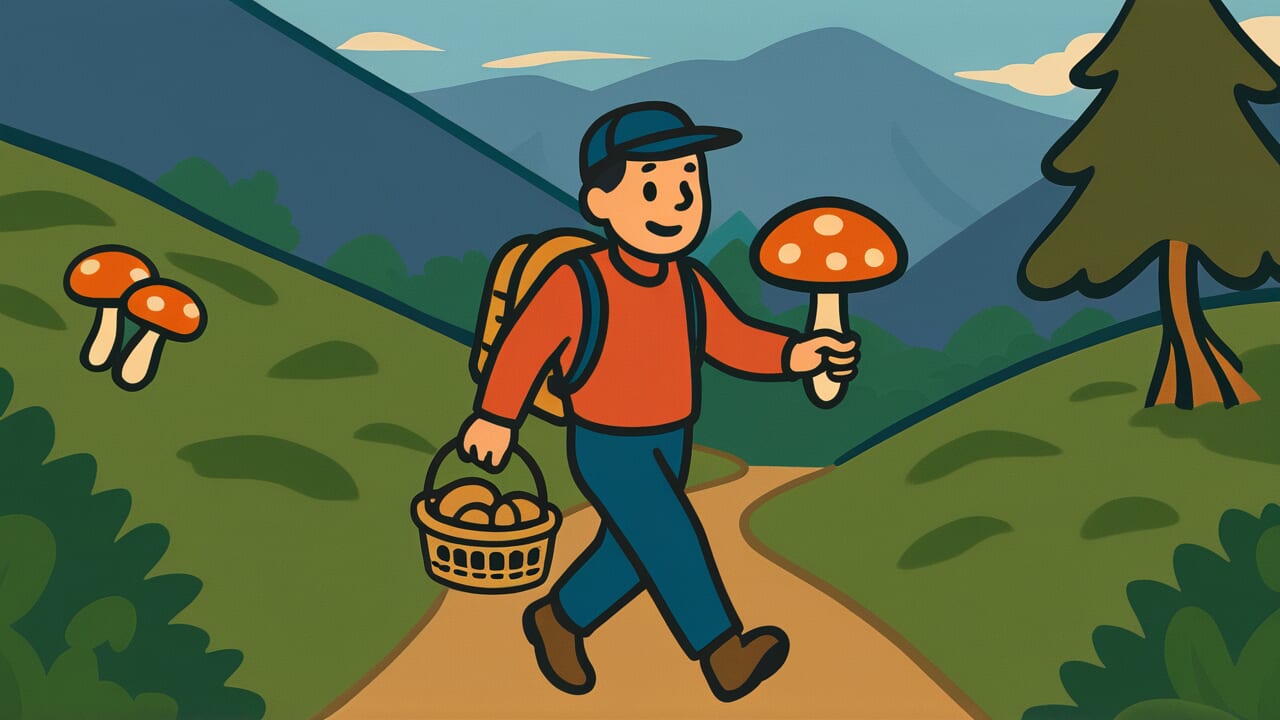How to Read “You can’t forget the mountain where you picked mushrooms”
たけとったやまはわすれられない
Meaning of “You can’t forget the mountain where you picked mushrooms”
This proverb describes a basic human trait. When you gain something valuable somewhere, that place stays in your memory.
Once a method works, once a place brings success, once a way brings profit, it gets deeply carved into your mind. You’ll want to return there again and again.
People use this saying to explain why someone sticks to past successes. It describes how people keep trying the same method that worked before.
Sometimes it carries a slightly ironic tone. It points out how one sweet taste of success keeps pulling people back to the same place.
This proverb works well because it uses a clear, concrete image. Picking mushrooms on a mountain is something everyone can picture.
Even today, it perfectly captures how people cling to successful experiences. It explains why we tend to rely on methods that worked in the past.
Origin and Etymology
No one knows exactly when this proverb first appeared in writing. But it clearly comes from Japan’s mountain village culture.
Mushroom picking has been an important way to gather food in Japan’s mountain areas for centuries. Places where valuable mushrooms like matsutake or shiitake grow are like treasure mountains.
Finding good mushroom spots isn’t easy. Like gathering wild vegetables, it requires local knowledge and experience.
What’s interesting is the strong wording. The proverb doesn’t just say you “remember” the place. It says you “can’t forget” it.
This stronger expression shows how deeply profitable experiences mark our memory.
Imagine finding a rich cluster of mushrooms in the mountains. Maybe you stumbled upon it by chance. Maybe you found it after hard searching.
Either way, the joy and excitement carve themselves into your heart. Next year, you’ll return. The year after that, you’ll return again.
Wise ancestors observed this repeated behavior pattern. They saw something fundamental about human nature in it. That’s probably how this proverb was born.
It’s a crystal of wisdom born from real farm and mountain village life experiences.
Usage Examples
- He hit it big at that store once, so like “you can’t forget the mountain where you picked mushrooms,” he goes there every week
- The method that made him money in stocks is like “you can’t forget the mountain where you picked mushrooms”—he keeps buying the same stock over and over
Universal Wisdom
“You can’t forget the mountain where you picked mushrooms” reveals deep wisdom about memory and desire. Why do profitable experiences stay so vivid in our minds?
It’s because successful experiences send powerful reward signals to our brains. Memories accompanied by joy and satisfaction get stored as priority information for survival.
This is a highly rational system that humanity acquired through evolution. Remembering where you found food, where you were safe, and what methods brought benefits was essential for survival.
But this instinctive memory mechanism has two sides. Attachment to success can steal your courage to explore new possibilities.
You stick to methods that worked before. You become unable to adapt to changing situations. This is also a universal human weakness.
Our ancestors found this deep understanding of humanity in the everyday act of picking mushrooms on mountains. One success can bind a person.
This truth never changes, no matter how times change. This proverb has been passed down because it strikes at the essence of human nature.
When AI Hears This
The human brain contains special nerve cells called “place cells.” They activate only when you’re in specific locations.
What’s more interesting is that these place cells don’t just record position information. They strongly connect with memories of what happened there.
When you find mushrooms, your brain simultaneously records location information and reward information. It saves them together as one package.
This memory strength has reasons directly tied to survival. For hunter-gatherer humans, forgetting where you found food was a life-or-death matter.
Research shows that memories of rewarding places stick about three times stronger than memories of empty places. The brain evolved to use limited memory capacity efficiently by prioritizing survival-useful information.
Even more noteworthy is how this memory gets stored as “episodic memory.” It includes visuals, smells, and emotions from that moment.
The sunlight filtering through trees on the mushroom mountain, the smell of soil, the joy of discovery—all recorded together. That’s why you can vividly recall it years later when you return.
This proverb expresses exactly what brain science has proven about memory mechanisms. The connection between reward and place is the work of neural circuits common to all humanity, beyond words and culture.
Lessons for Today
This proverb teaches us how to maintain a healthy relationship with successful experiences. Knowing methods that worked before is certainly a great asset.
But if you’re too bound by them, you can’t adapt to a changing world.
You surely have unforgettable success experiences too. They’re sources of confidence and support during difficult times.
But at the same time, it’s important to occasionally stop and think. Is that experience becoming a chain holding you back from new challenges?
Modern society changes quickly. Yesterday’s right answer doesn’t necessarily work today.
Learn from past successes, but have courage to explore new mountains. This is the wisdom we should learn from this proverb.
Remembering the mountain where you picked mushrooms is wonderful. But unseen mountains might have even richer mushrooms waiting.
Treasure the past while looking toward the future. That balance will be the key to enriching your life.



Comments